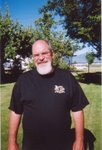
The Lodging
George Mackay Brown
The stones of the desert town
Flush; and, a star-filled wave,
Night steeples down.
From a pub door here and there
A random ribald song
Leaks on the air.
The Roman in a strange land
Broods, wearily leaning
His lance in the sand.
The innkeeper over the fire
Counting his haul, hears not
The cry from the byre;
But rummaging in the till
Grumbles at the drunken shepherds
Dancing on the hill,
And wonders, pale and grudging,
If the queer pair below
Will pay their lodging.
Oh, this is a magnificent poem! Let’s read it again slowly.
That word flush in the first verse should not be understood merely as a synonym for blush, but more in its sense of exaltation, the way someone will walk into a room flush from an early morning walk along the sea. In this way, the stones recall the moment in Luke 19:37-40 when the Pharisees ask Jesus to rebuke his disciples for loudly praising him. Jesus explains that, “if [my disciples] should hold their peace, the stones would immediately cry out.” This is what the stones do in the poem, responding to the Incarnation—a cosmic event when heaven, like a star filled wave, steeples down. If the spires atop a cathedral represent man’s reach for God, on Christmas Eve God returns the compliment.
Most men, however, are unaware of the wondrous inhalation Nature has made. They remain ignorant of the divinity that cascades down on them. The bar crowds continue to sing their filthy ditties, the occupation forces are weary, bored and melancholy—and businessmen continue to cavort with Mammon in midnight obsession. When heaven breaks in upon him, the world’s most famous innkeeper grumbles and assumes that the shepherds he sees dancing on the hill are drunk—just as the inhabitants of Jerusalem would later assume that the apostles on Pentecost were intoxicated with new wine. The innkeeper does not hear the new cry coming from the dilapidated barn down the road. His only wonder is a question: Does any money come from Nazareth?
George Mackay Brown
The stones of the desert town
Flush; and, a star-filled wave,
Night steeples down.
From a pub door here and there
A random ribald song
Leaks on the air.
The Roman in a strange land
Broods, wearily leaning
His lance in the sand.
The innkeeper over the fire
Counting his haul, hears not
The cry from the byre;
But rummaging in the till
Grumbles at the drunken shepherds
Dancing on the hill,
And wonders, pale and grudging,
If the queer pair below
Will pay their lodging.
Oh, this is a magnificent poem! Let’s read it again slowly.
That word flush in the first verse should not be understood merely as a synonym for blush, but more in its sense of exaltation, the way someone will walk into a room flush from an early morning walk along the sea. In this way, the stones recall the moment in Luke 19:37-40 when the Pharisees ask Jesus to rebuke his disciples for loudly praising him. Jesus explains that, “if [my disciples] should hold their peace, the stones would immediately cry out.” This is what the stones do in the poem, responding to the Incarnation—a cosmic event when heaven, like a star filled wave, steeples down. If the spires atop a cathedral represent man’s reach for God, on Christmas Eve God returns the compliment.
Most men, however, are unaware of the wondrous inhalation Nature has made. They remain ignorant of the divinity that cascades down on them. The bar crowds continue to sing their filthy ditties, the occupation forces are weary, bored and melancholy—and businessmen continue to cavort with Mammon in midnight obsession. When heaven breaks in upon him, the world’s most famous innkeeper grumbles and assumes that the shepherds he sees dancing on the hill are drunk—just as the inhabitants of Jerusalem would later assume that the apostles on Pentecost were intoxicated with new wine. The innkeeper does not hear the new cry coming from the dilapidated barn down the road. His only wonder is a question: Does any money come from Nazareth?
______________________________
"The Lodging" is found in The Collected Poems of George Mackay Brown, Copyright 2005, John Murray, publishers.

